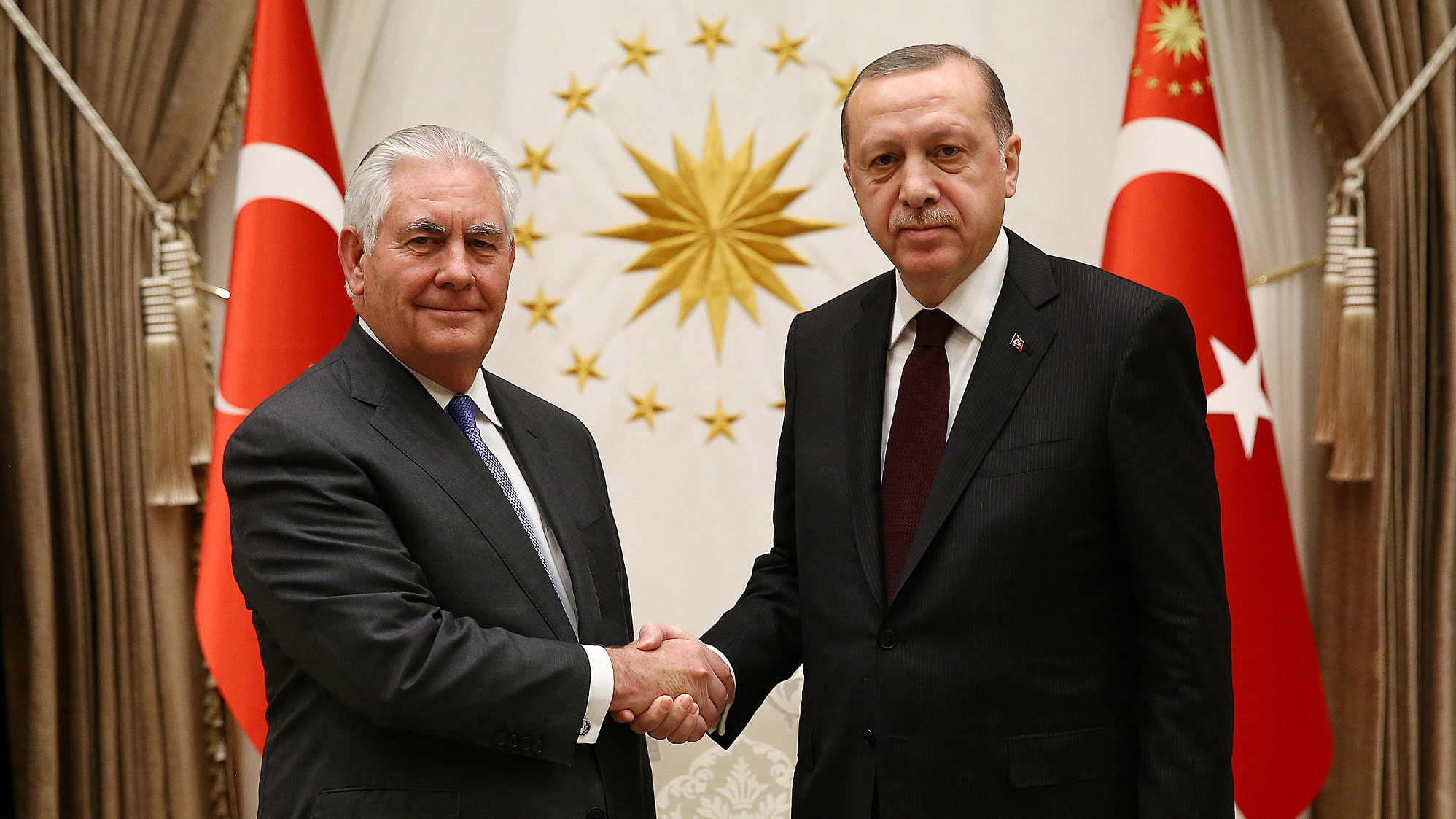A dispute between Turkey and the United States over the control of a northern Syrian town has pitted the NATO allies against each other, putting them on opposing sides of the conflict’s front line and deepening a diplomatic rift.
On Wednesday, US
Secretary of State Rex Tillerson met with Turkish leaders over a dinner that lasted for over three and a half hours, holding tough discussions in an attempt to ease increasing tensions with a key NATO ally. The meeting with Turkish President Recep Tayyip Erdogan and Foreign Minister Mevlut Cavusoglu, who acted as a translator, was highly unusual because Tillerson wasn't accompanied by an American translator or a notetaker. Analysts pointed out that for Tillerson, it was more important to listen than to talk on this trip, as they expressed belief that Erdogan wanted the US official to listen to and compromise with Turkey.
Despite its position as a NATO ally, Turkey has become a difficult matter for the US. And mutual trust is in need to be re-established.
"We don't want promises and pledges from the US. We want concrete steps... the trust that has been lost needs to be restored, and the cause of the lost trust is [the] US," Cavusoglu said.
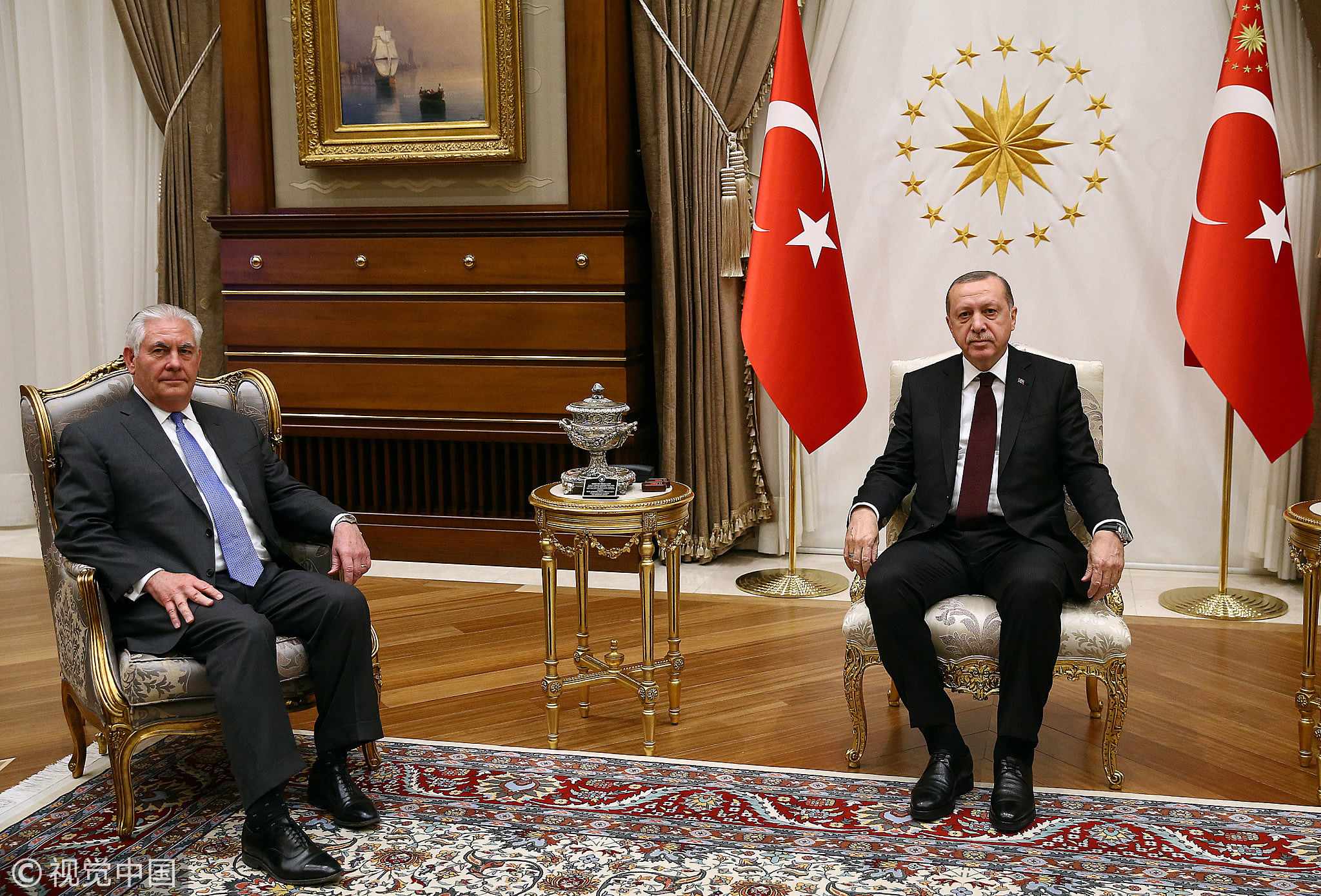
Turkish President Tayyip Erdogan (R) meets US Secretary of State Rex Tillerson (L) in Ankara, Turkey, February 15, 2018. /VCG Photo
Turkish President Tayyip Erdogan (R) meets US Secretary of State Rex Tillerson (L) in Ankara, Turkey, February 15, 2018. /VCG Photo
Ties between the United States and Turkey have frayed after
Turkey invaded Syria to battle Kurdish militants allied with Washington in the fight against ISIL (the US government is considering sending a new 550 million US dollars of aid to the Kurds), and a court case in New York exposed alleged collaboration by top Turkish politicians and bankers in violating US sanctions on Iran. Further straining bilateral ties is Turkey's demand for the extradition of Fetullah Gulen, a Turkish cleric in self-exile in the US whom Erdogan blames for
a failed coup attempt against him in July 2016.
On the other side, the US has many dissatisfactions with Turkey. Washington has expressed increasing alarm over Erdogan's consolidation of power since the putsch, including a
sweeping crackdown on opposition parties, the media, and lawyers and academics. Relations are so strained that some members of the US Congress have even begun to advocate for sanctioning Turkey.
More facts may help us understand the current relationship of the two countries: investment by US firms in Turkey’s economy has declined after relations between the two countries deteriorated. Turkish Deputy Prime Minister Fikri Işık on February 11 said Ankara would not refrain from closing the Incirlik Airbase in Turkey if Ankara’s long-term interests ask for it. Established in 1954 by a joint-use agreement between the Turkish and US military, the airbase has about 5,000 US troops, and is home to the 39th Air Base Wing of the US Air Force.
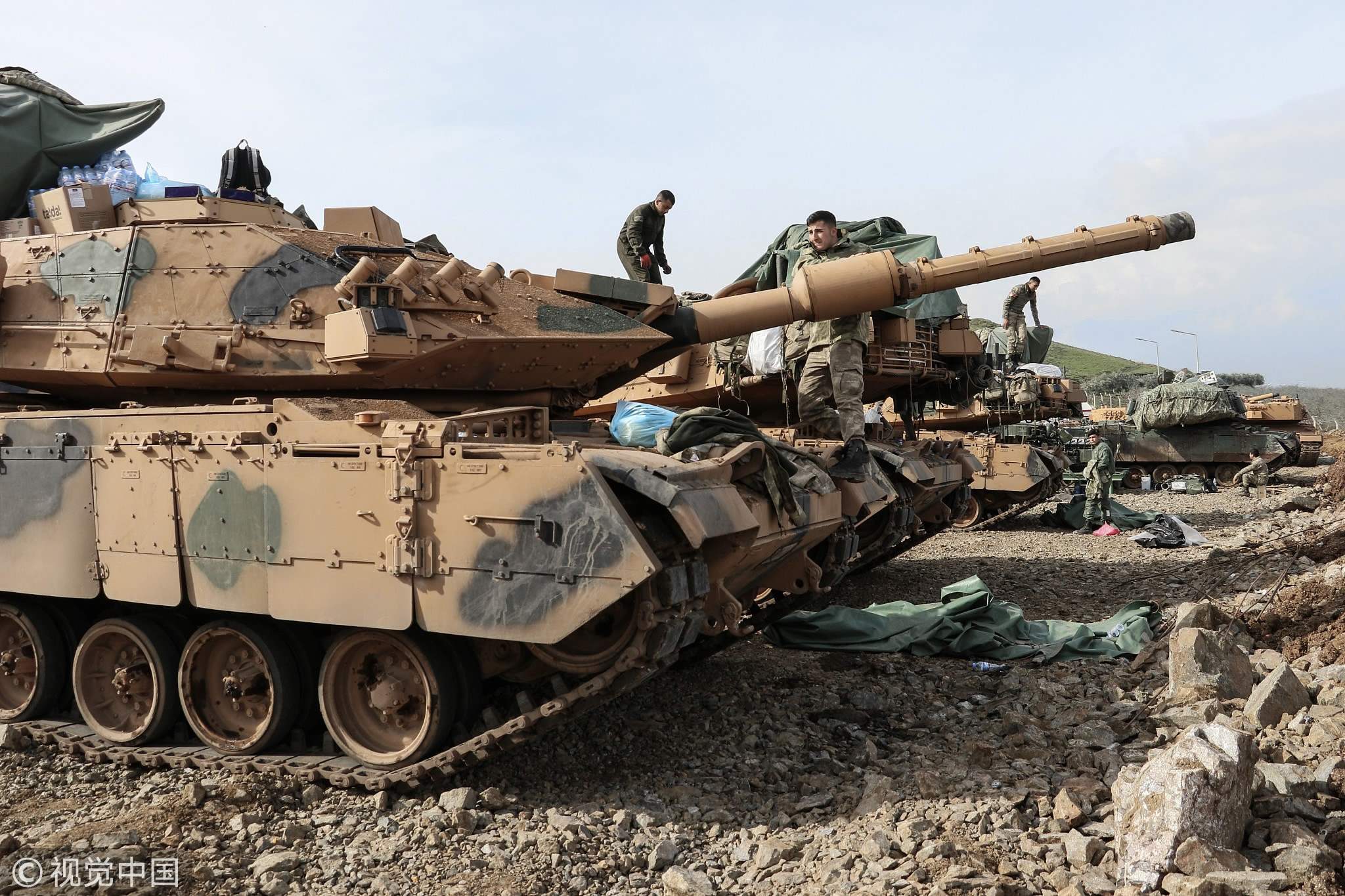
In Turkey's Hatay province, military vehicles are being transported to border units as artillery units of Turkish Armed Forces continue to hit Kurdish group targets in border towns and Syrian territory as part of the "Operation Olive Branch" launched in Syria's Afrin, February 14, 2018. /VCG Photo
In Turkey's Hatay province, military vehicles are being transported to border units as artillery units of Turkish Armed Forces continue to hit Kurdish group targets in border towns and Syrian territory as part of the "Operation Olive Branch" launched in Syria's Afrin, February 14, 2018. /VCG Photo
As Turkish leaders talk of extending their military offensive against the Kurdish-held Syrian district of Afrin to Manbij, where hundreds of US troops are based, people are beginning to doubt whether the administration of US President Donald Trump has a strategy to deal with
Turkey’s maneuvers in Syria. In other words, any plan the United States has in store to persuade Ankara, or even on what issues it can try to influence the Turkish government, appears to be up in the air.
Actually, US leaders do not dare to fully condemn the attacks. US is one of the largest weapons suppliers to Turkey, selling F-4s, F-16s and Cobra helicopters that Turkish forces now use in Afrin. If the situation gets worse, the US may block weapons to Turkey, and it would be strategically effective.
Up until now, the US has decided not to apply targeted sanctions on Turkish officials responsible for the planning and execution of the operation in Afrin. The US administration’s inability to communicate the government’s positions clearly makes matters worse. Prior to
Turkey’s Afrin operation, the Pentagon announced a new US-trained, predominantly Kurdish “Border Protection Force” in eastern Syria. When Turkey objected, the State Department effectively walked back from the announcement.
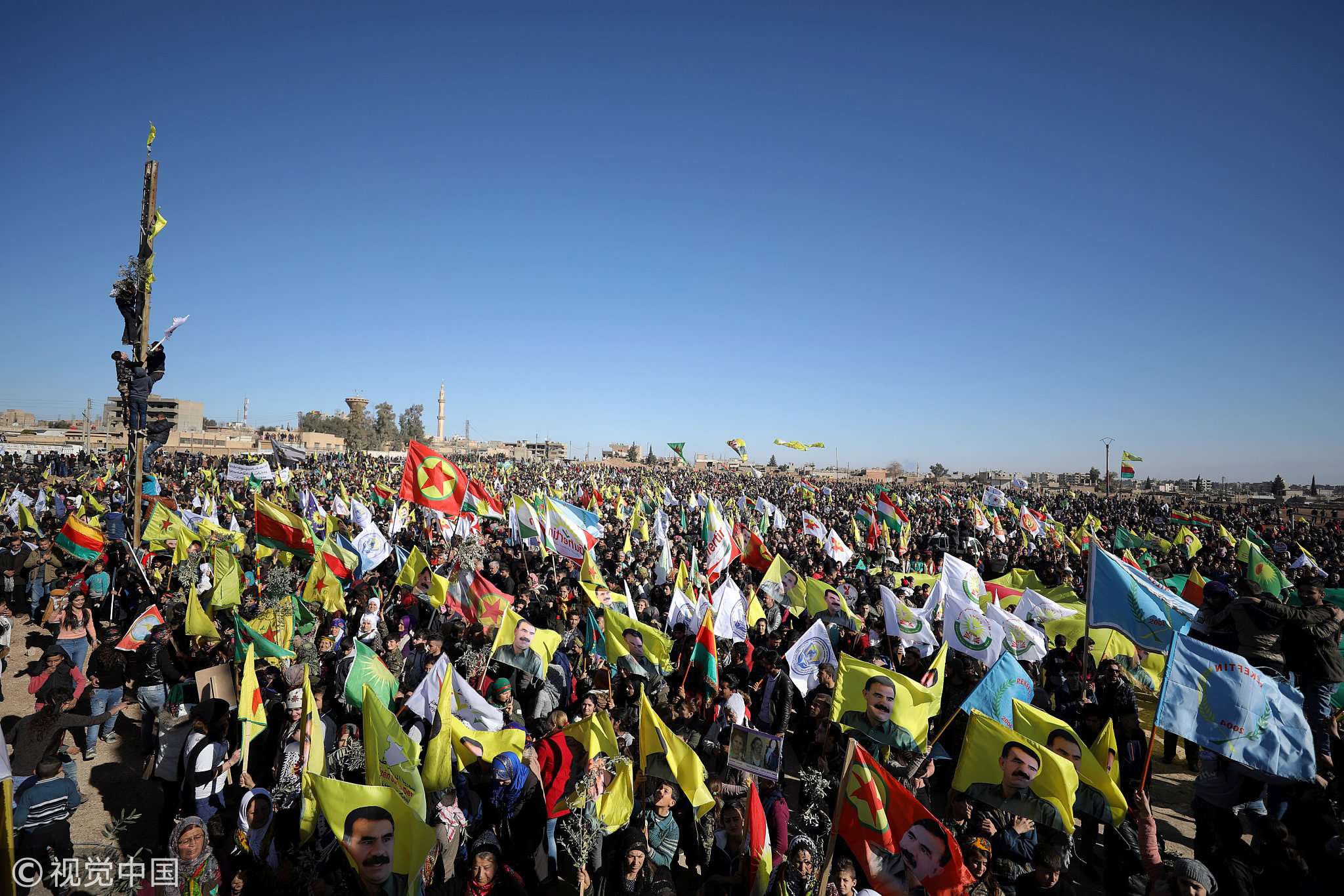
People hold flags during a protest against the Turkish operation in Afrin in Qamishli, Syria, January 30, 2018. /VCG Photo
People hold flags during a protest against the Turkish operation in Afrin in Qamishli, Syria, January 30, 2018. /VCG Photo
Now,
Turkey and the United States have clearly demonstrated that they are at odds over the Kurds in northern Syria, especially in Manbij. Washington, through Tillerson, had explained to Ankara that the United States’ only ally in Syria is the Kurds and that the US alliance with the Kurds is vital for American interests to break Russian and Iranian influence in the country. Tillerson tried to convince Turkey’s top officials that this stated goal is supposed to be also good for Ankara as an ally.
But the Turkish president has already made up his mind to oppose the US.
Turkey’s operation in Afrin is another mystery. The military offensive entered its third week, and there is very little progress being made. So far, the Turkish army has lost 20 soldiers. In a sense, Turkey is complying with the US demand to keep the incursion limited, but it is hard to predict how long the operation will last.
A possible conflict between the two countries shows how much the relationship between former allies has soured. Even if there is no clash between US and Turkish forces, the possibility of conflict between their proxies is bigger than ever. For Turkey, the dispute has pushed relations with the United States to a breaking point.
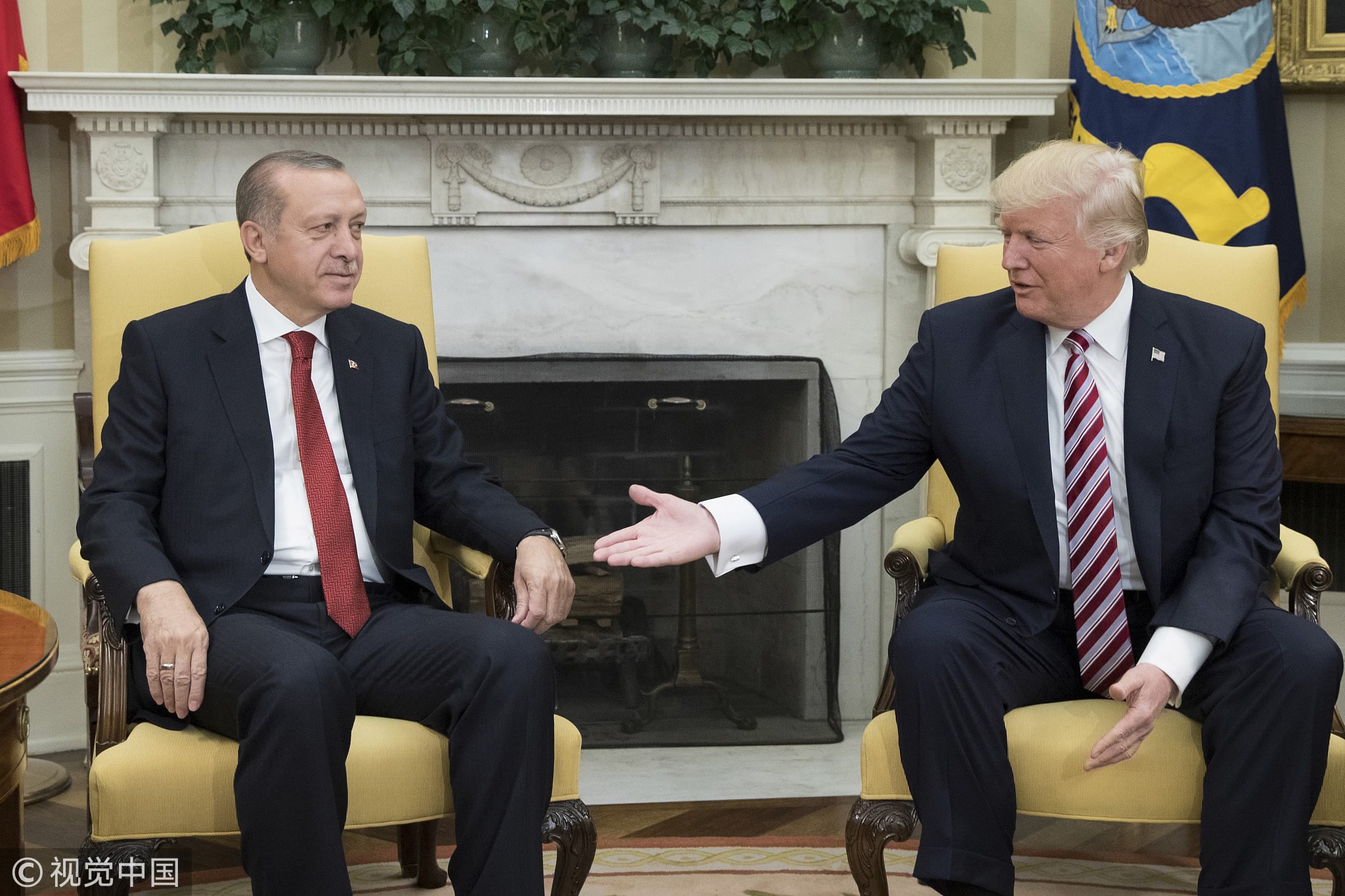
US President Donald Trump (R) extends his hand for a handshake with President of Turkey Recep Tayyip Erdogan (L), in the Oval Office of the White House in Washington, DC, May 16, 2017. /VCG Photo
US President Donald Trump (R) extends his hand for a handshake with President of Turkey Recep Tayyip Erdogan (L), in the Oval Office of the White House in Washington, DC, May 16, 2017. /VCG Photo
“Our ties are at a very critical stage,”
Foreign Minister Cavusoglu said. “Either we will improve our ties, or they will completely deteriorate.” So nobody in Ankara is optimistic about the future of US-Turkey ties.
Erdogan’s harsh attitude toward the US is emboldened by a popular anti-US sentiment in Turkey, where 83 percent of the people view the United States unfavorably, according to a poll by the left-wing policy group Center for American Progress published on Feb. 12. The poll also found that 46 percent of Turks think their country should do more to confront the United States, compared with 37 percent who believe it should maintain the alliance.
The Turkish government has been sending some very strong messages in recent days, urging US officials to say something new in upcoming encounters with their Turkish counterparts. Cavusoglu’s rhetoric has been a little calmer, saying Turkey is in favor of a continued alliance “based on mutual trust,” and calling on the US to take “concrete steps” to this end.
Tillerson repeatedly acknowledged Turkey’s security concerns on its borders but, at the same time, expressed Washington's annoyance about developments in northwestern Syria.
Turkey wants to see an immediate withdrawal of YPG militants from Manbij to the east of the Euphrates, as previously promised by the US, and wants the US to cease its military and political cooperation with the YPG, while also calling on the US to take back weapons already delivered to the YPG. It would be surprising to see a breakthrough in troubled Turkish-US ties if Tillerson fails to say something new in Ankara, thus changing the current context.
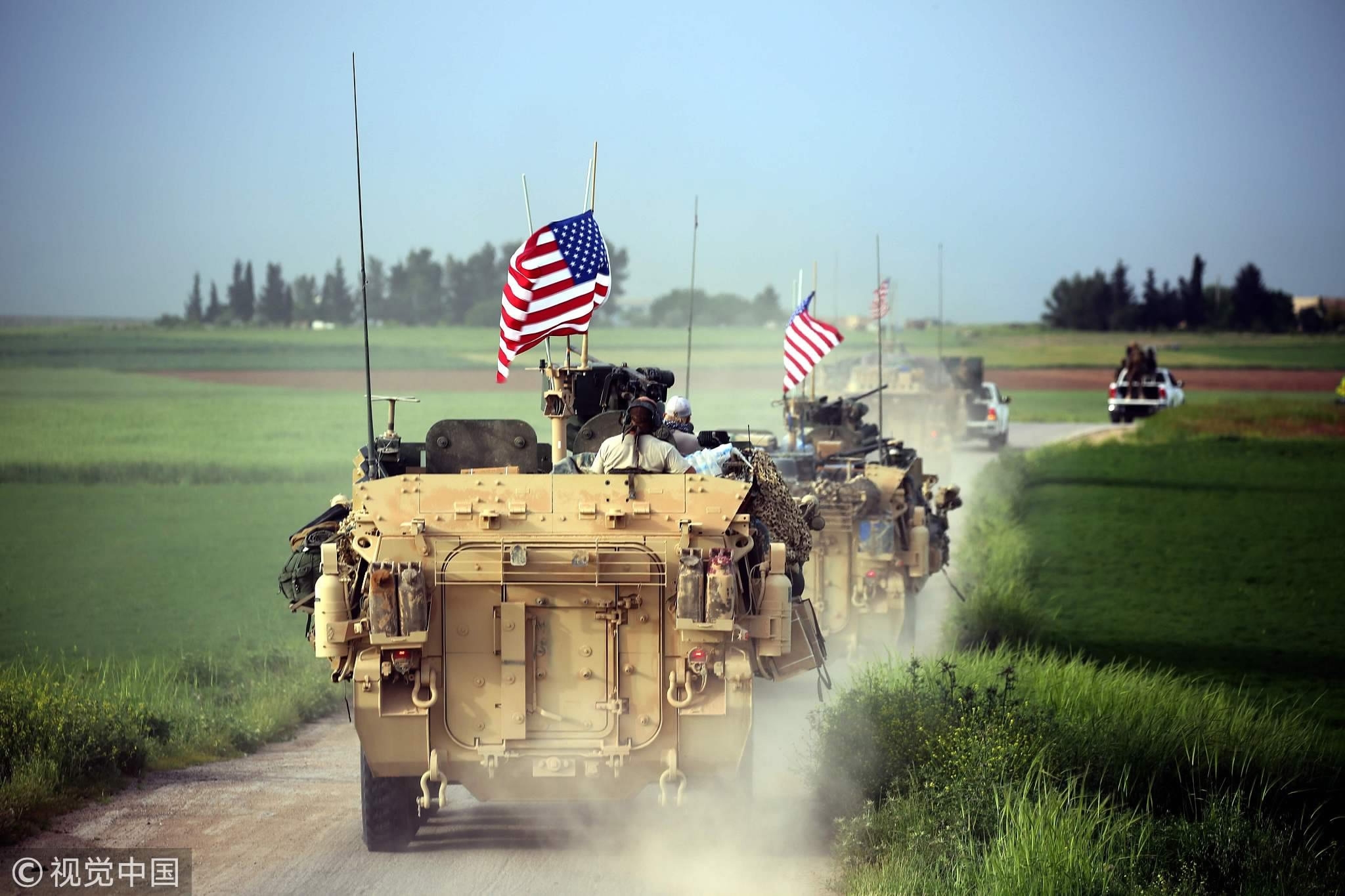
US forces, accompanied by Kurdish People's Protection Units (YPG) fighters, drive their armored vehicles near the northern Syrian village of Darbasiyah, on the border with Turkey, April 28, 2017. /VCG Photo
US forces, accompanied by Kurdish People's Protection Units (YPG) fighters, drive their armored vehicles near the northern Syrian village of Darbasiyah, on the border with Turkey, April 28, 2017. /VCG Photo
Turkey seems to be ready to re-define its relationship with the US, abandoning its longstanding strategic partnership with Washington. From the US’ perspective, Turkey is out of control. Even if a conflict over Manbij can be avoided now, the United States and Turkey will remain on a collision course without a sustained, high-level dialogue. Ultimately, if Erdogan is determined to destroy the US-Turkish alliance, there is nothing Trump or anyone can do to stop him.
As the grievances between Washington and Ankara have become greater, Turkey has built bridges with rival powers Russia and Iran. The three countries agreed so far on an ineffectual plan to wind down the fighting between the Syrian army, which is supported by Russian air power and Iran-backed militias, and jihadist fighters and Turkish-backed rebels. Turkey says its Afrin operation has been consented by Russia, which controls most of the air space in western Syria. In contrast, it says the United States has yet to honor several pledges: stop arming the YPG, take back those arms after ISIL was defeated in Syria, and pull back YPG forces from Manbij.
(Zhou Rong is a professor at the Chongyang Institute for Financial Studies of Renmin University of China. The article reflects the author's opinion, and not necessarily the view of CGTN.)

